How To Get Rid Of Cavities – 8 Home Remedies To Follow
Bid your painful tooth decay goodbye with these simple, effective natural solutions.
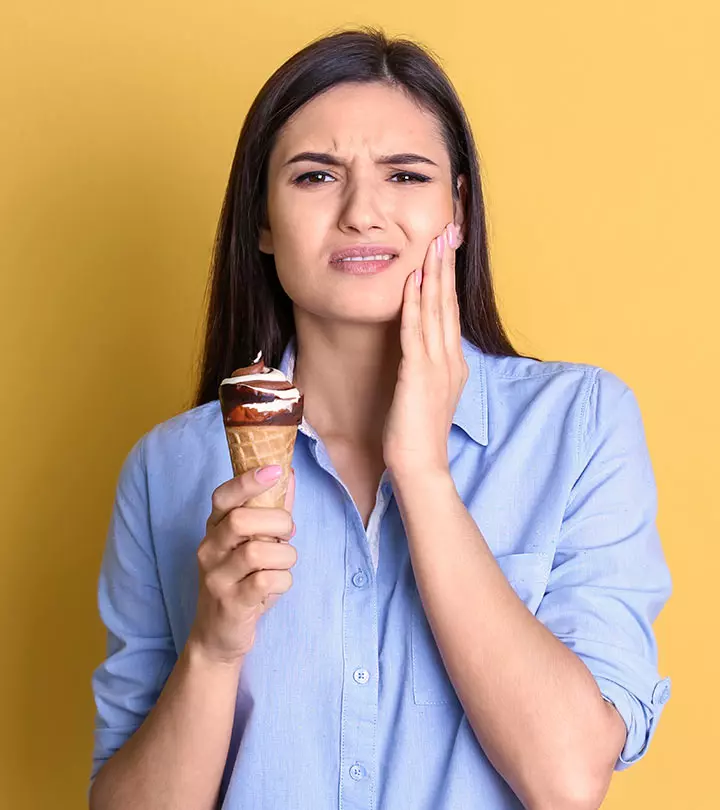
Image: Shutterstock
Cavities, also known as dental caries, are a highly prevalent dental disorder that can afflict people of all ages. Globally, 3.58 billion people are affected by oral disorders, with dental caries being the most common (1). But worry not – as here we tell you how to get rid of cavities using some simple home remedies.
Maintaining good oral health requires an understanding of cavities. They are not only uncomfortable dental conditions; if neglected, they can result in more serious dental problems. You can effectively manage cavities and prevent them from affecting your oral health by identifying the warning symptoms early and taking preventive measures. Some signs that you may have cavities include aching teeth, a blackened or browned surface of the teeth, and heat and cold sensitivity, amongst other symptoms. If your dental hygiene isn’t up to par, you’re in danger of acquiring cavities or tooth decay.
Continue reading to learn more about cavities and how to treat a cavity at home.
In This Article
What Is A Cavity?
Cavities are areas on the hard surface of your teeth that have been permanently damaged
. Cavities often develop into tiny openings or holes on the teeth and can be caused due to several factors. This condition is also referred to as tooth decay or caries.
Cavities are one of the most common oral health problems. They are quite common across a wide age group, ranging from children and teenagers to older adults.
Read on to look at the common causes of cavities.
Key Takeaways
- To get rid of plaque and bacteria, brush your teeth two times every day and floss frequently.
- Consume calcium-rich foods, such as dairy products, to strengthen your teeth and prevent cavities.
- To lessen irritation and eliminate bacteria, rinse your mouth with salt water.
- To prevent cavities and enhance dental health, use coconut oil.
- To avoid dental decay, stay away from sugary and acidic meals and beverages.
- To relieve dental pain, use clove oil or mouthwash that contains cloves.
- If you want to avoid cavities and enhance your oral health, try oil pulling using coconut or sesame oil.
- To prevent and treat cavities, schedule routine dental checkups and professional dental cleaning sessions.
What Causes Cavities?
Cavities usually develop in various steps. They are:
- Formation Of Plaque – Plaque is a layer of transparent and sticky film that coats your teeth. This can harden under or above your gumline to form tartar, which is even more difficult to remove. Keeping plaque in check is critical, and knowing how to remove tartar from teeth can reduce buildup and support cavity prevention.
- Attack By Plaque – The presence of acid in plaque can cause loss of minerals in the enamel of the affected tooth. This can cause your tooth to erode and develop tiny openings or holes on it, which is the first stage of cavities. If your enamel begins wearing away, the bacteria and acid from the plaque can reach the inner layer of your tooth, called the dentin. This progression results in sensitivity.
- Continuation Of Destruction – Tooth decay can progress to the inner teeth material (pulp) that contains the nerves and blood vessels. Bacteria can irritate the pulp and may cause it to swell. The swelling of the pulp can cause the nerves to become pressed, thus causing pain and permanent damage.
If you are dealing with cavity pain, try home remedies for toothache, such as clove oil, baking soda, vanilla extract, etc., as they can provide relief while addressing the underlying issue.
Almost everyone with teeth is at risk of tooth decay or cavities. Other factors that may increase your risk of developing cavities are (2):
- Location of the tooth – Tooth decay often affects the back teeth, your molars, and premolars.
- Foods and drinks that may stick to your teeth for a long time like milk, ice cream, soda, or other sugary foods/drinks
- Frequent snacking or sipping on sugary drinks
- Feeding infants at bedtime
- Poor oral hygiene habits
- Dry mouth
- Worn-out fillings or dental devices
- Heartburn
- Eating disorders like bulimiai A serious, life-threatening eating disorder in which you consume large quantities of food in one sitting. or anorexiai A serious psychological and eating disorder characterized by abnormally low body weight and fear of gaining weight.
Cavities in children also occur due to these factors, especially after eating foods with high sugar content and going to bed without brushing or flossing teeth.
As your cavities progress, they may exhibit the following symptoms.
Symptoms Of Cavities
- Toothache that occurs without any cause
- Tooth sensitivity
- A mild to sharp pain while eating sugary, hot, or cold foods
- Appearance of visible holes or pits in your teeth
- Pain while biting down
- Brown, black, or white stains on the surface of your tooth
A survey conducted on 193.5 million participants found that more than 1 in 5 adults within the had untreated caries. The prevalence of untreated caries was reported as 21.3%. It was most prevalent in those aged 30 through 39 years (25.2%) and 40 through 49 years (22.3%).
If you have noticed any of your teeth beginning to rot, it is high time that you treat them. If the cavity is not treated, the decay will eventually reach the tooth’s nerve tissue and the deepest layer of the tooth, necessitating either a root canal or tooth extraction to save your dentures. Keep scrolling to understand how to stop a cavity from getting worse.
Note: It is essential that you seek medical intervention to prevent permanent damage. The following home remedies may fix a cavity and/or reverse cavities only if the decay hasn’t penetrated the dentin, i.e., if it is in the pre-cavities stage.
How To Fix A Cavity: 8 Natural Remedies
1. Vitamin D

A study published in The Journal of the Tennessee Dental Association states that vitamin D plays a significant role in regulating oral health. It mediates calcium absorption and stimulates the production of antimicrobial peptides (3). Hence, it is necessary to follow a diet rich in vitamin D to prevent periodontal diseasesi An infection caused by bacteria in the mouth affecting the dental tissues, resulting in gum inflammation and can destroy the jawbone. and cavities.
You Will Need
Vitamin D-rich diet
What You Have To Do
- Follow a vitamin D-rich diet that includes foods like fatty fish, egg yolks, and cheese.
- Consult a doctor if you intend taking additional supplements for this vitamin.
How Often You Should Do This
You may do this regularly.
2. Sugar-Free Gum
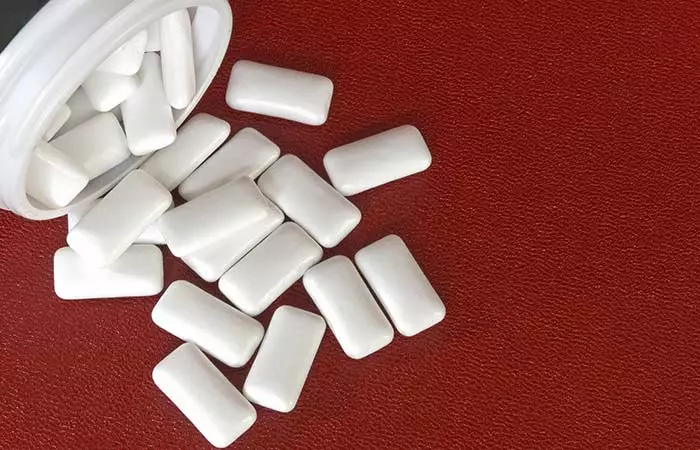
In a study published in the Journal Of Applied Oral Science, sugar-free chewing gum was found to exhibit caries-reducing effects (4). However, more research is required to establish its effectiveness.
You Will Need
Sugar-free chewing gum
What You Have To Do
Chew on sugar-free chewing gum.
How Often You Should Do This
You may do this 1-2 times daily.
3. Fluoride Toothpaste
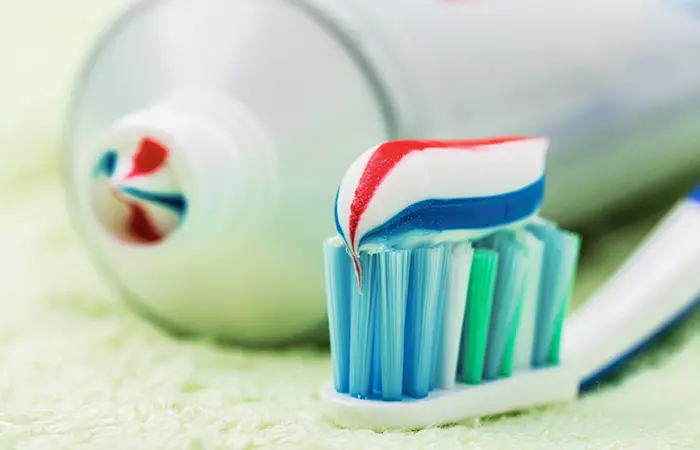
Regular tooth brushing with a fluoride-based toothpaste can help reduce and control cavities or tooth decay (5).
You Will Need
Fluoride toothpaste
What You Have To Do
- Brush your teeth with any good quality fluoride-based toothpaste.
- Rinse your mouth thoroughly with water.
How Often You Should Do This
You may do this 2-3 times daily, preferably after every meal.
4. Coconut Oil Pulling
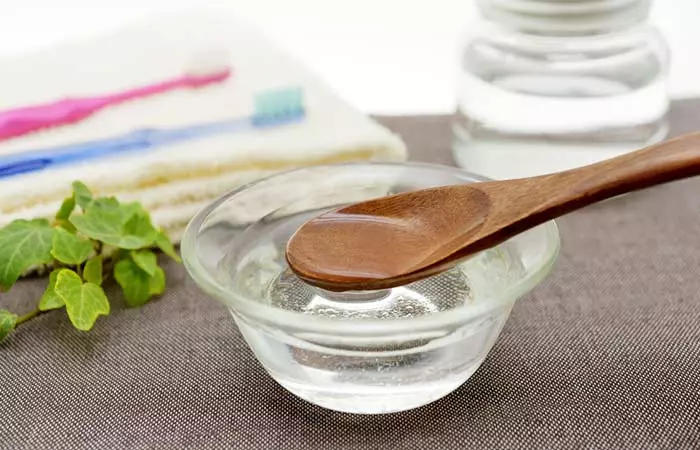
According to the Journal of Traditional and Complementary Medicine, oil pulling with coconut oil can help fight oral microbes, thereby preventing cavities and plaque formation. It also helps promote oral health (6).
Paul, a YouTuber, shared his experience of doing coconut oil pulling to achieve better oral hygiene. He said, “After a week or so into this experiment, the plaque behind my front lower teeth was breaking down and my whole area there was smooth. It really reduced plaque and bacteria (i).”
You Will Need
1 tablespoon of cold-pressed virgin coconut oil
What You Have To Do
- Swish a tablespoon of virgin coconut oil in your mouth.
- Do this for 10-15 minutes and spit it out.
- Brush and floss your teeth.
How Often You Should Do This
You may do this once daily.
 Quick Tip
Quick Tip5. Licorice Root
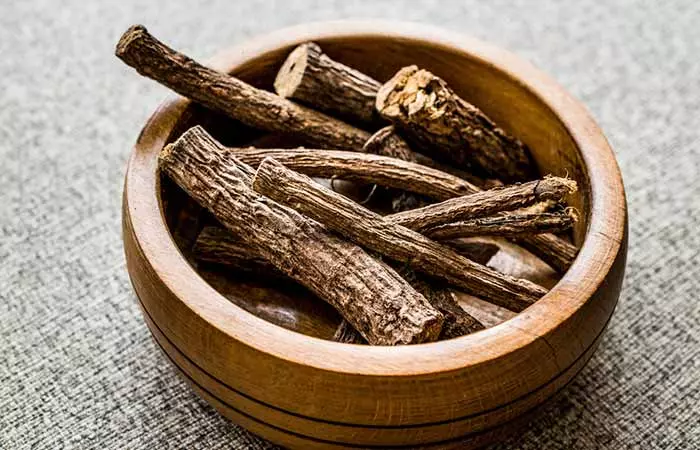
Licorice root may help treat cavities due to its powerful antimicrobial effects against oral pathogens. According to a study published in the Journal of International Oral Health, this extract exhibits better inhibitory effects than chlorhexidine – an antimicrobial agent found in mouthwashes (7).
You Will Need
A licorice root
What You Have To Do
- Brush your teeth with a bristled licorice root.
- Alternatively, you can use licorice powder to brush your teeth.
- Rinse it off with water.
How Often You Should Do This
You may do this 1-2 times daily.
6. Aloe Vera
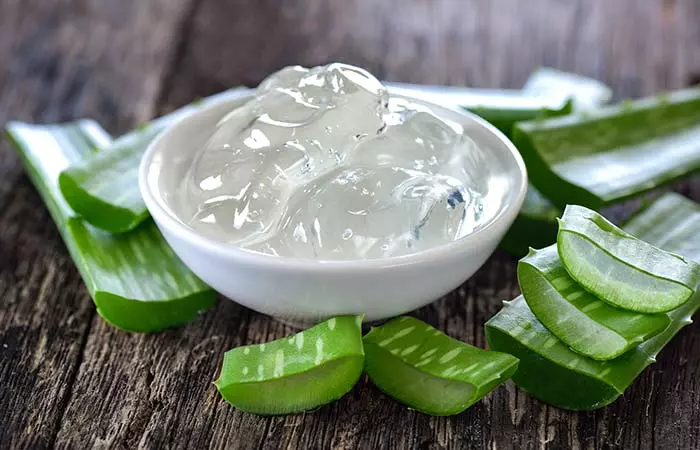
A study published in the Journal of Pharmacy and Bioallied Sciences shows that aloe vera gel can help fight cavity-causing oral microbes far better than many commercially available toothpastes (8). Hence, you can use this remedy to deal with dental caries.
You Will Need
½ teaspoon of aloe vera gel
What You Have To Do
- Take half a teaspoon of freshly extracted aloe gel on your toothbrush.
- Use it to brush your teeth for a couple of minutes.
- Rinse your mouth thoroughly with water.
How Often You Should Do This
You may do this 1-2 times daily.
Caution: Do not use this remedy if you are pregnant or breastfeeding or have allergies to plants from the Liliaceae family.
7. Neem

According to a study published in The Journal of Contemporary Dental Practice, neem exhibits excellent antimicrobial potential against various strains of bacteria responsible for causing dental caries (9). Hence, the practice of chewing neem sticks should be encouraged to assist in treating cavities.
You Will Need
A neem stick
What You Have To Do
Chew on a neem stick.
How Often You Should Do This
You may do this once daily.
 Quick Tip
Quick Tip8. Tea Tree Oil
Tea tree oil possesses natural antibacterial properties that help combat the bacteria responsible for cavities. When applied topically, it may potentially slow down the progression of the cavity (10).
You Will Need
- Tea tree oil, 1 to 2 drops
- Carrier oil (such as coconut oil or olive oil), as needed
What You Have To Do
- Mix 1 to 2 drops of tea tree oil with the carrier oil and dilute it.
- Use a clean cotton swab or a toothpick to apply the diluted tea tree oil to the cavity.
- Gently massage the oil onto the cavity and surrounding gums for a few minutes.
- Spit out any excess oil. But ensure you are not rinsing your mouth immediately. This is to allow the tea tree oil to work.
How Often You Should Do This
Do this once a day, preferably before bedtime.
If we are talking about oils for reducing pain, besides tea tree, you can also try applying clove oil for toothache. It is a popular remedy due to its numbing and antibacterial properties, which can help manage pain from cavities.
All these remedies are scientifically proven to help in treating cavities. But, they may not be effective in eliminating cavities completely. In such cases, professional treatment is imperative. Learn more in the next section.
Professional Treatments For Cavities
Home remedies can help manage cavities in their early stages and offer comfort but they are not a substitute for professional dental care. Only a qualified dentist is capable of doing procedures like fillings, crowns, or root canals, which may be necessary for severe cavities. Regular checkups are important to prevent cavities and maintain general dental health.
Here are some prevention tips to help prevent further decaying of your teeth.
How To Prevent Cavities
- Cut out sugary foods from your diet.
- Avoid foods that contain phytic acid, like barley, maize, millets, oats, rice, and wheat.
- Brush your teeth after every meal.
- Always rinse your mouth with mouthwash after brushing your teeth. Consider using a mouthwash containing fluoride or other antibacterial formulas to further prevent tooth decay. Mouthwash offers an extra line of defense against cavities by getting to places that brushing and flossing may not reach.
- Make an appointment with your dentist every few months.
- Consider trying out dental sealants that seal your back teeth and prevent the accumulation of food in them.
- Avoid snacking and sipping on sugary drinks too often.
Infographic: 3 Home Remedies To Treat Cavities
Everyone desires beautiful white teeth. But oral health is mostly ignored by all. Even though we all should pay a visit to the dentist once a year, yet we mostly ignore it until we feel the pain. But what if we tell you that you can take care of your oral health at home by just using these simple remedies? Read on for easy home remedies to take care of your oral health. Illustration: StyleCraze Design Team
Tooth decay, carries, or cavities all refer to the condition where the hard surface of the teeth is damaged. Plaque formation is a huge risk factor for developing cavities, though poor oral hygiene and sugary or sticky food intake can be equally responsible, among other factors. Cavities present symptoms such as increased tooth sensitivity, sharp pain while eating certain food items, toothache with no apparent cause, visible holes in the teeth, and stains on the surface of the teeth. Home remedies with ingredients like vitamin D supplements, fluoride toothpaste, sugar-free gum, etc., can get rid of cavities only if treated in the early stages. For cavities that have penetrated deep, medical attention is needed.
Did you find this post helpful? Let us know in the comments section below.
Frequently Asked Questions
Can cavities spread?
While cavities cannot spread directly, the germs that cause it can spread via direct mouth to mouth contact or indirect contact like use of shared utensils, sneezing, kissing, etc.
Can you pass cavities by kissing?
You can pass the germs or bacteria that causes cavities to another person via kissing.
How long does it take to remineralize teeth?
It can take 3 to 4 months for remineralization of your decaying tooth.
How does a cavity look?
A cavity can cause the development of tiny openings or holes on the teeth, thereby causing permanent damage on any hard surface of the affected tooth.
How to heal a cavity without fillings?
When treated before permanent damage is done, at an early stage, a cavity can heal without fillings. Using a fluoride-based toothpaste to brush your teeth, rinsing your mouth with a good mouthwash, and also trying out any of the above remedies can help in healing a cavity.
When to visit a dentist for cavities?
If you experience recurring toothaches or increased tooth sensitivity, visit a doctor immediately to avail treatment.
Can baking soda get rid of cavities?
Possibly. Anecdotal evidence suggests that baking soda may help break the build-up of plaque and work against the pathogenic bacteria.
Can cavities affect your brain?
Possibly. People with cavities are more susceptible to experiencing bleeding in the brain than those without cavities (11).
Can salt water remove cavities?
Possibly. Swishing salt water in your mouth may destroy the pathogens that cause dental caries.
Can stress cause cavities?
While a direct connection between stress and cavities is yet to be discovered, stress may disturb your immune system and may adversely affect your dental health (12).
Illustration: How To Get Rid Of Cavities - 8 Home Remedies To Follow
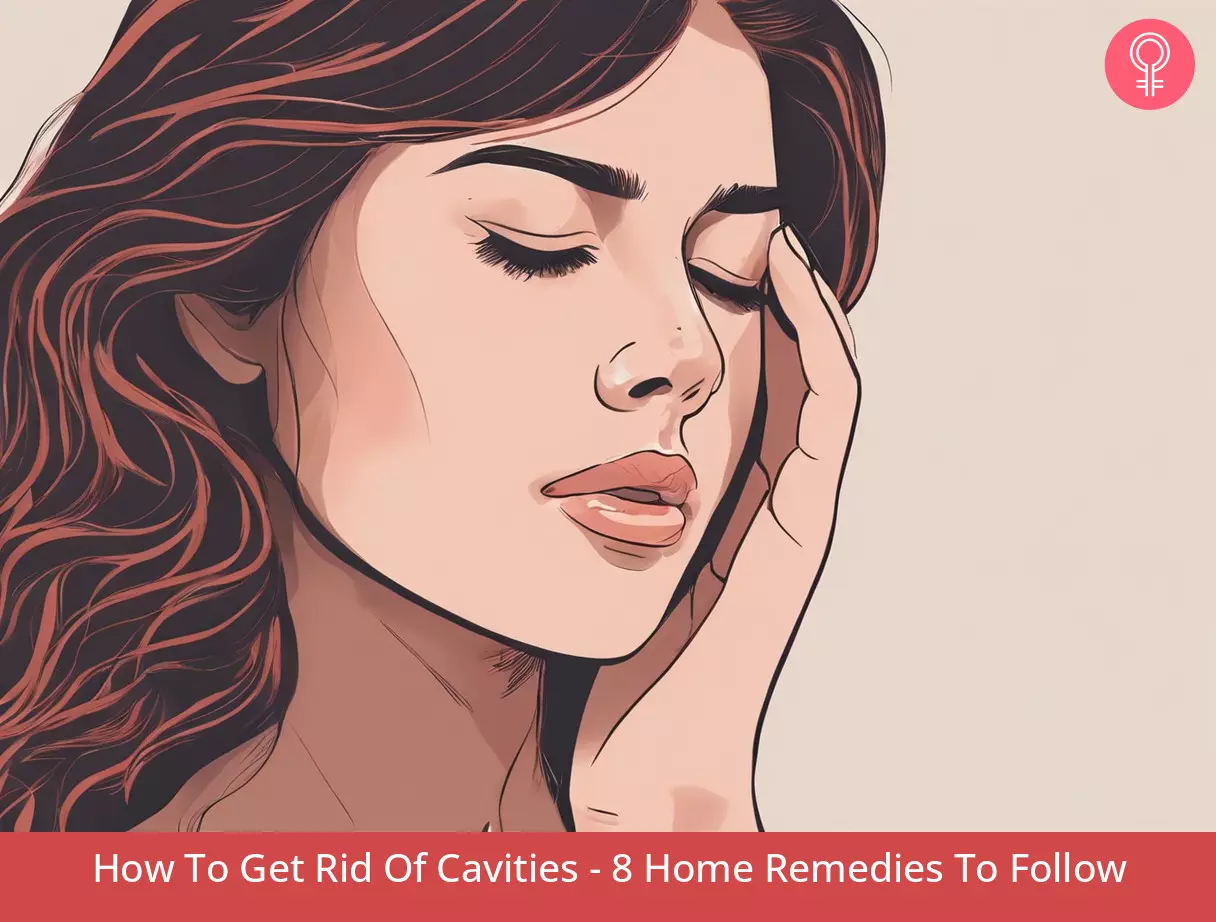
Image: Stable Diffusion/StyleCraze Design Team
Learn how to naturally treat cavities with coconut oil swishing! Discover the simple steps to help you get rid of them without expensive treatments in this video.
Personal Experience: Source
StyleCraze's articles are interwoven with authentic personal narratives that provide depth and resonance to our content. Below are the sources of the personal accounts referenced in this article.
i. Does Coconut Oil Pulling Work? My Experience After 3 Months!https://www.youtube.com/watch?v=vsGTm5epSIk
References
Articles on StyleCraze are backed by verified information from peer-reviewed and academic research papers, reputed organizations, research institutions, and medical associations to ensure accuracy and relevance. Read our editorial policy to learn more.
- “Oral Health” World Health Organization.
- “Prevalence of periodontal disease, its association with systemic diseases and prevention” International Journal Of Health Sciences, US National Library Of Medicine, National Institutes of Health.
- “Vitamin D and its impact on oral health–an update” Journal of the Tennessee Dental Association, US National Library Of Medicine, National Institutes of Health.
- “SUGAR-FREE CHEWING GUM AND DENTAL CARIES – A SYSTEMATIC REVIEW” Journal Of Applied Oral Science, US National Library Of Medicine, National Institutes of Health.
- “Anticaries effectiveness of fluoride toothpaste: a meta-analysis” Journal of Public Health, US National Library Of Medicine, National Institutes of Health.
- “Oil pulling for maintaining oral hygiene – A review” Journal of Traditional and Complementary Medicine, US National Library Of Medicine, National Institutes of Health.
- “Effect of Aqueous and Alcoholic Licorice (Glycyrrhiza Glabra) Root Extract Against Streptococcus Mutans and Lactobacillus Acidophilus in Comparison to Chlorhexidine: An In Vitro Study” Journal Of International Oral Health, US National Library Of Medicine, National Institutes of Health.
- “Benefits of Aloe vera in dentistry” Journal Of Pharmacy & Bioallied Sciences, US National Library Of Medicine
- “The efficacy of neem extract on four microorganisms responsible for causing dental caries viz Streptococcus mutans, Streptococcus salivarius, Streptococcus mitis and Streptococcus sanguis: an in vitro study.” Journal of Contemporary Dental Practice, US National Library Of Medicine, National Institutes of Health.
- “Role of Herbal Agents – Tea Tree Oil and Aloe vera as Cavity Disinfectant Adjuncts in Minimally Invasive Dentistry-An In vivo Comparative Study.” Journal of Clinical & Diagnostic Research, US National Library Of Medicine, National Institutes of Health.
- “Dental Caries a Risk Factor for Intracerebral Hemorrhage” AHA Journal
- Stress and periodontal disease: The link and logic!!, Industry Psychiatry Journal, US National Library Of Medicine, National Institutes of Health.
Read full bio of Dr. Thomas Connelly
Read full bio of Shaheen Naser
Read full bio of Arshiya Syeda
Read full bio of Dipti Sharma









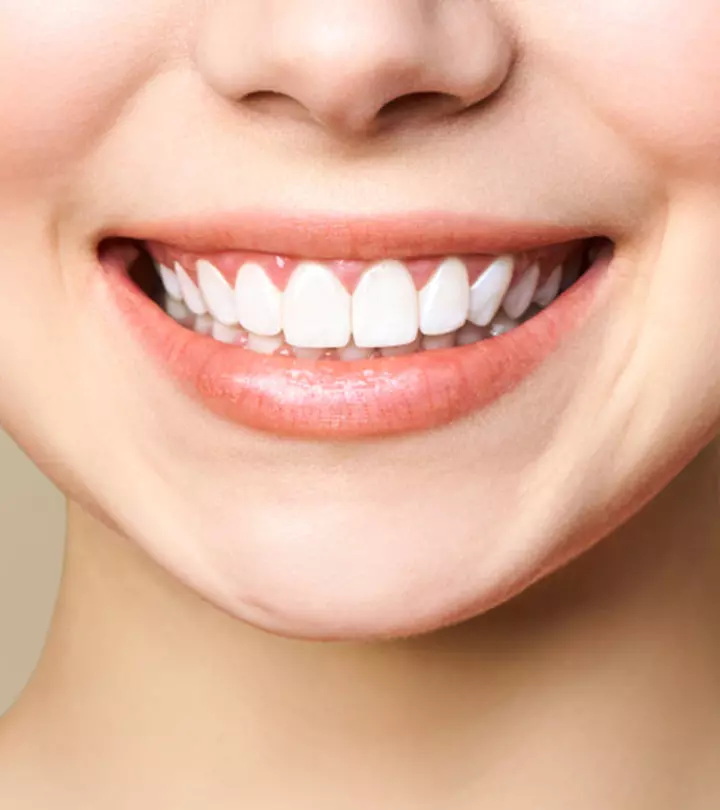
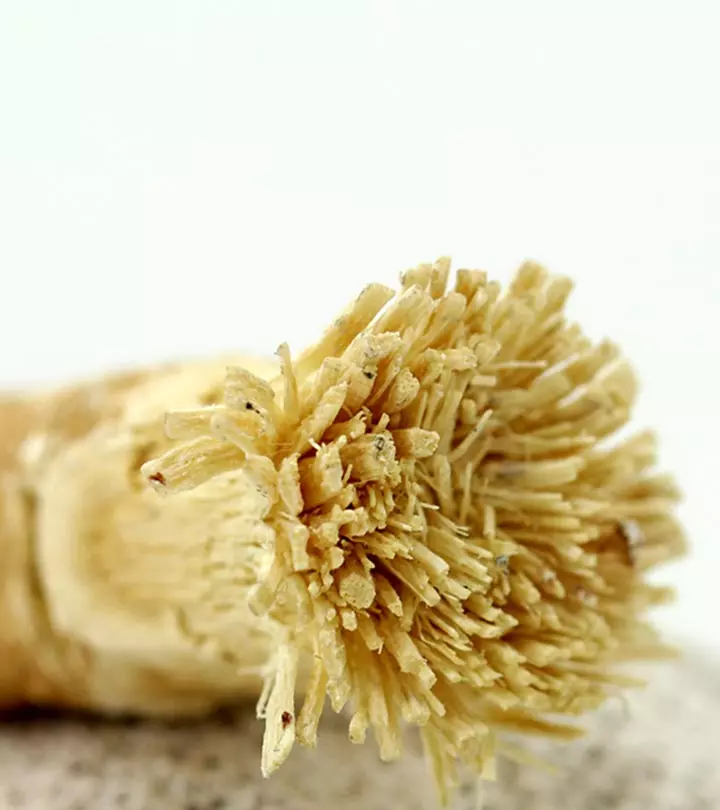




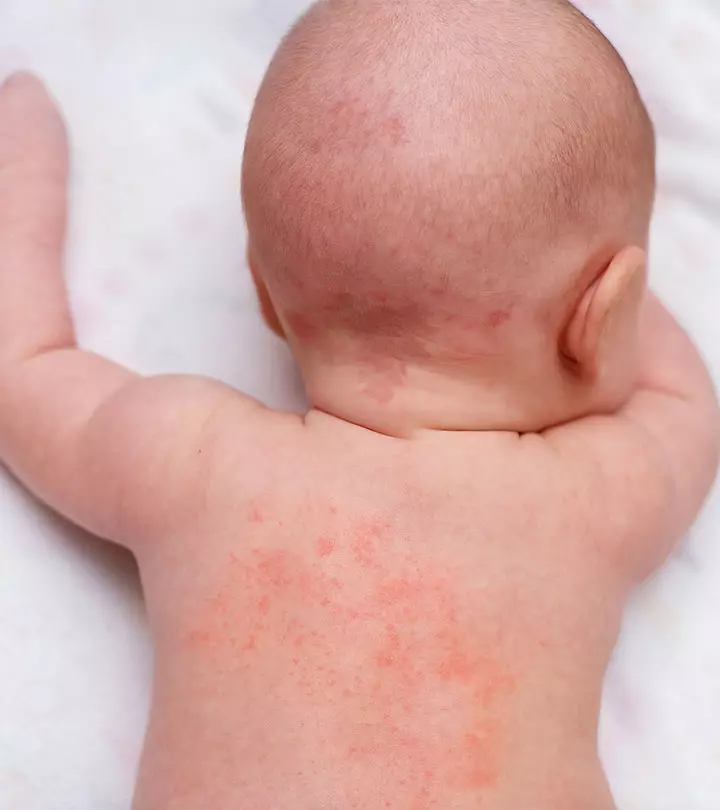
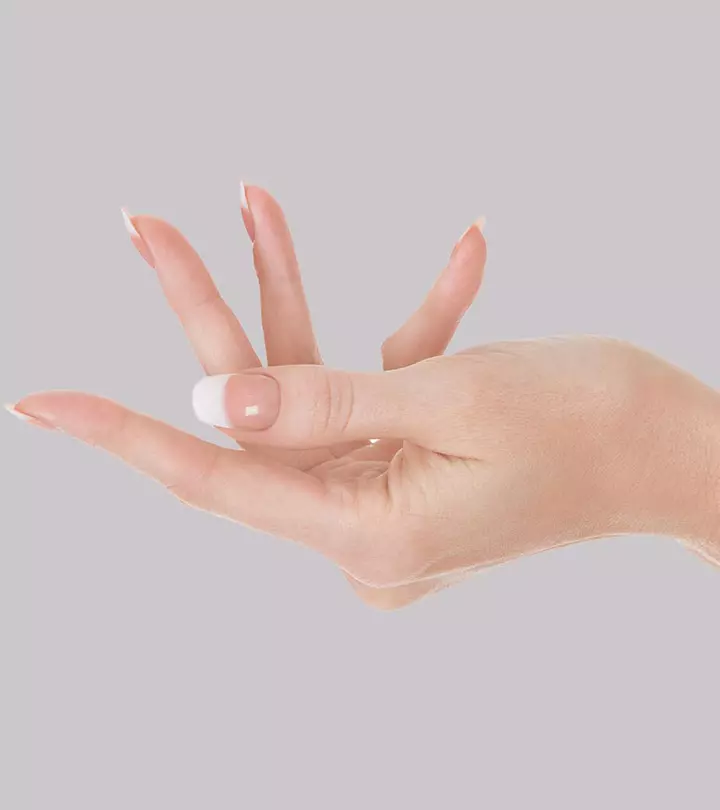
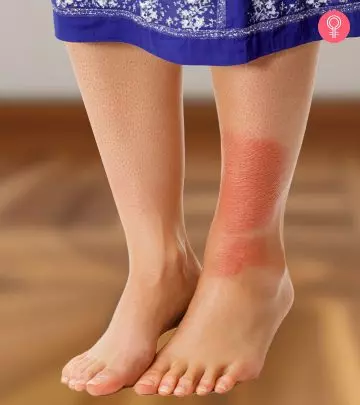
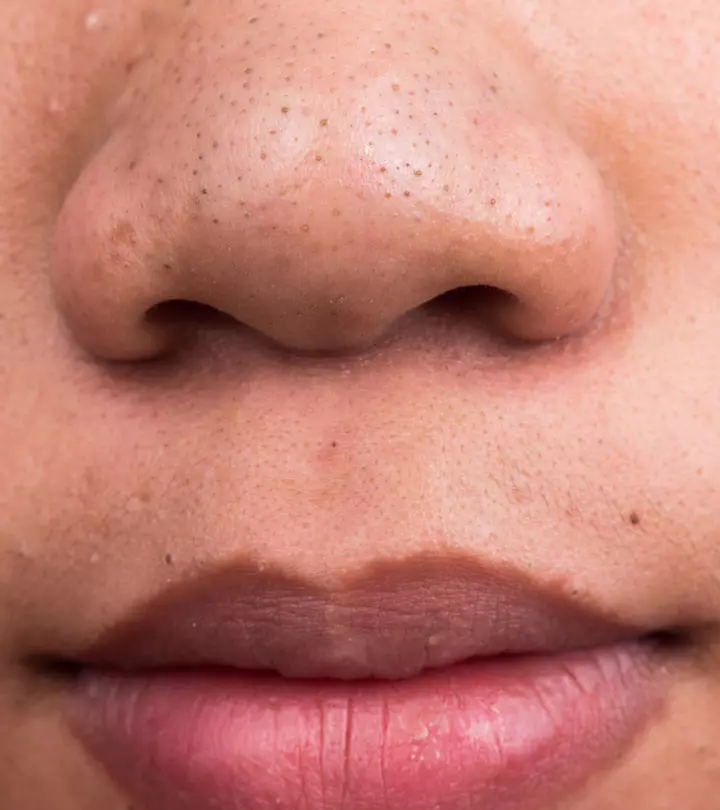

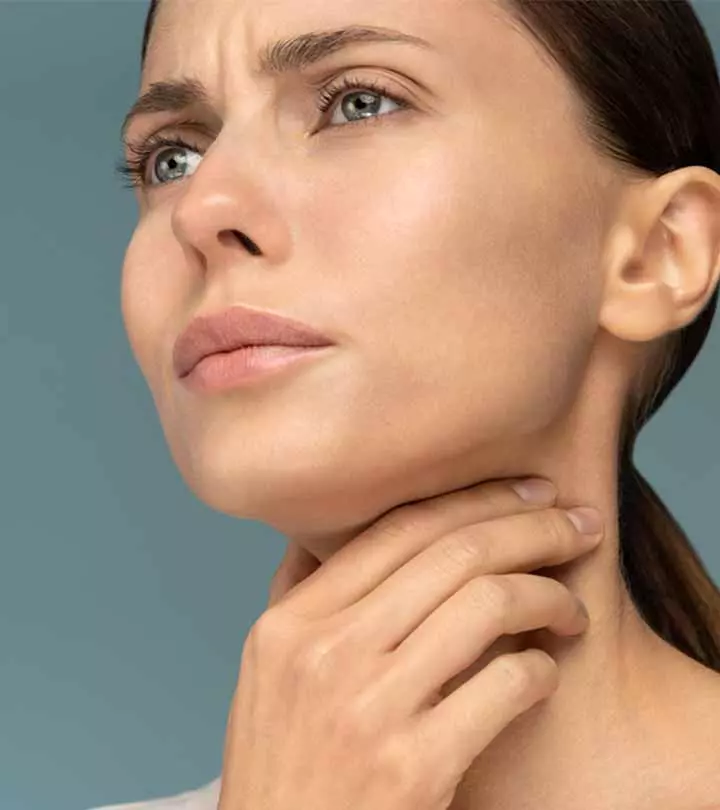



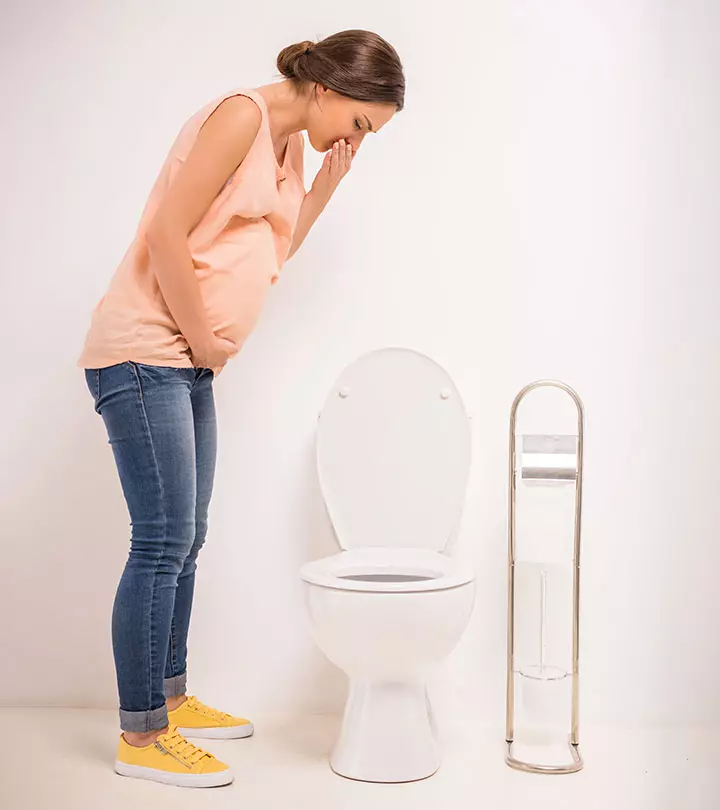

Community Experiences
Join the conversation and become a part of our empowering community! Share your stories, experiences, and insights to connect with other beauty, lifestyle, and health enthusiasts.